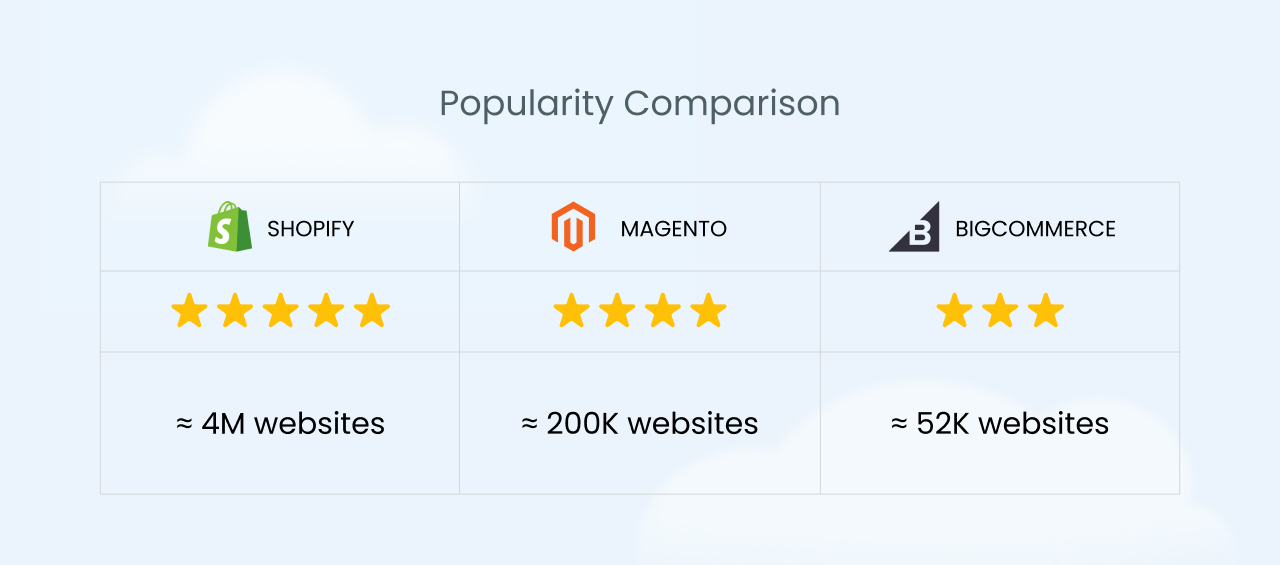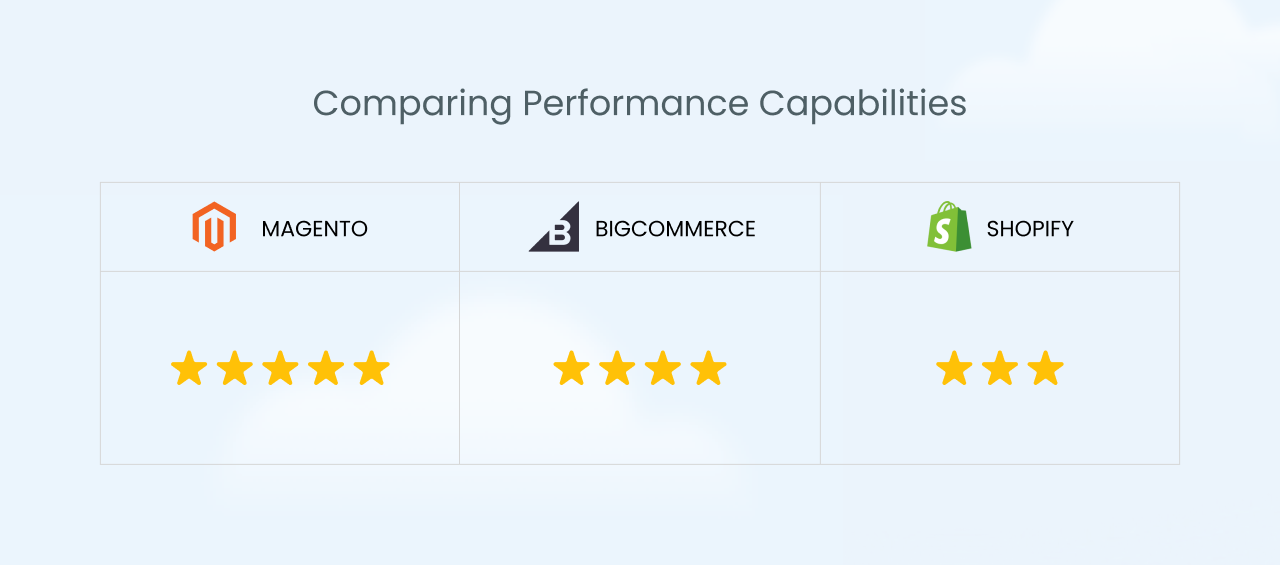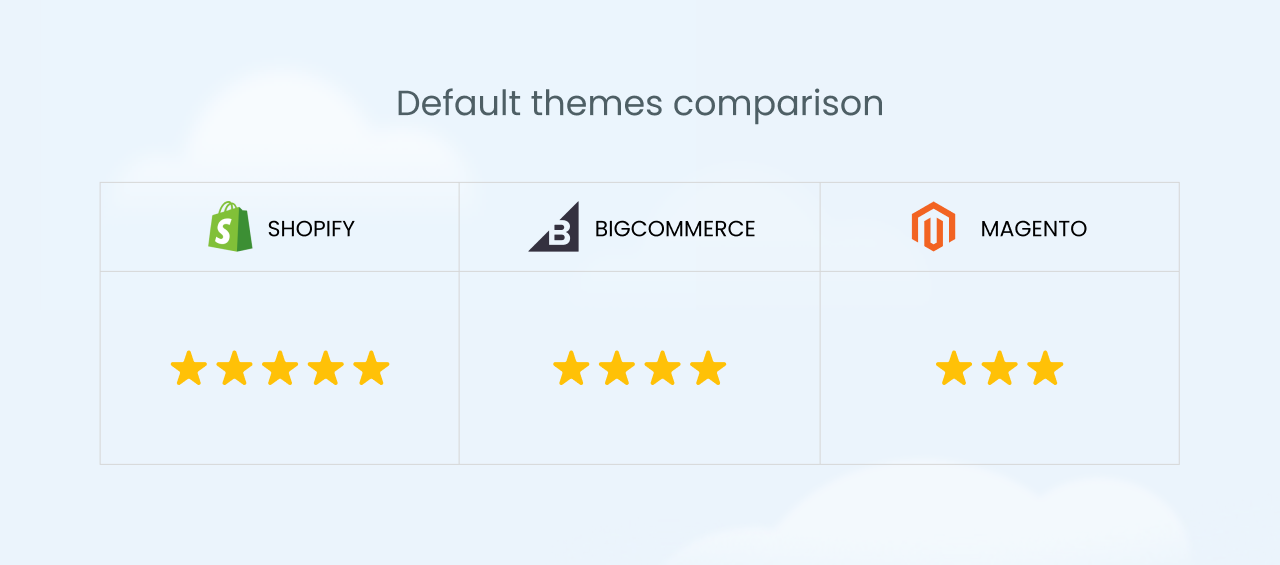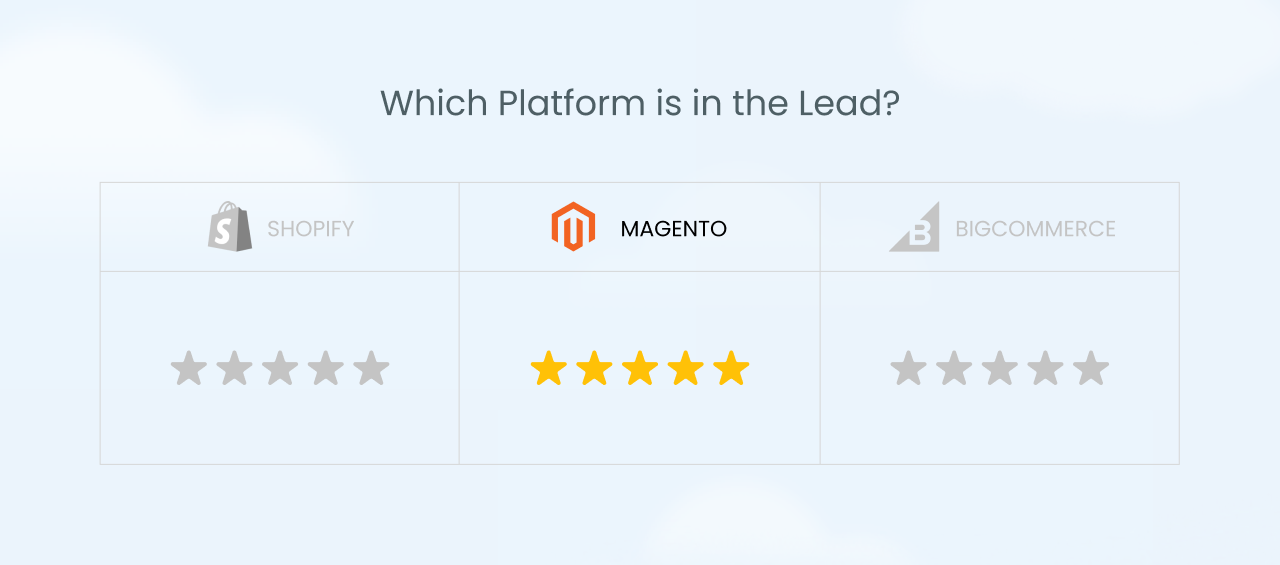BigCommerce vs Shopify vs Magento is arguably the most difficult choice to make when starting your own business.
A well-chosen eCommerce platform will allow you not only to organize the workflow in a high-quality manner, but also to shape a better customer experience.
In order to make the most correct choice, it is important to evaluate:
- the scale of your business
- functionality, necessary for launching and developing your eCommerce store
- the amount of money you are willing to invest in eCommerce development
Let’s compare the three most popular eCommerce platforms and determine which is the best for your business.
Magento vs. BigCommerce vs. Shopify: Pricing
Although price should never be your number one deciding factor, but let’s get this out of the way first.

- Magento: is Magento free to use? That depends on which version you choose: Magento Open Source or Adobe Commerce (previously Magento Commerce or Magento Enterprise Edition). The Magento website’s pricing page isn’t too helpful, but with a bit of digging around, here’s what you should note. Magento Open Source is free, but it doesn’t include hosting costs, design, and development charges. If you decide to build your eCommerce store with basic functionality and make it live, you will need nearly $15,000 on average (please note it depends on a variety of factors like hourly rates of a development agency). If you’re looking for more comprehensive choices, the Adobe Commerce and Adobe Commerce cloud would be the ones to pursue. The average enterprise Magento store project cost will fall in the $22,000-$125,000 range.
- BigCommerce the pricing range depends on what you’re looking for in your eCommerce business. Once again, your online store’s complexity and the range of services you need will be determining your actual cost. Prices vary from $29.95 to $299.95 per month. For an enterprise-level solution, you’ll have to get a tailor-made quote.
- Shopify: You may mistake this eCommerce platform for the most affordable solution. Granted it’s true for the basic Shopify platform version, the Shopify Plus cost amounts to $2,000/month. In the case of the Standard Shopify version, prices may fluctuate, depending on your online store’s complexity. Generally speaking, you’ll have to spend $29 to $299 per month.
BigCommerce vs Shopify vs Magento: Which One Is the Most Popular?

The BuiltWith platform regularly updates their database to show the number of eCommerce sites built on the most popular eCommerce platforms. Here are the latest findings when it comes to Magento vs Shopify vs BigCommerce comparison:
- The eCommerce market share of Magento is 185,679 websites. Most of them are located in the USA. After the platform was bought by Adobe, it is constantly evolving, adding new functionality and advanced features. Gartner, the world’s leading research and advisory company, nominated Magento as the best eCommerce platform for lots of years in a row.
- As for Shopify, its market share is 3,856,909 websites. The main users of this platform are also located in the USA, but the share of European eCommerce companies here is bigger than Magento`s one.
- The list of BigCommerce customers is pretty small compared to previous eCommerce platforms. According to BuiltWith, BigCommerce has 52,198 customer companies. Like its competitors, US websites account for a large share.
Functionality comparison in Magento vs Shopify vs BigCommerce
Magento, BigCommerce and Shopify offer a range of functionalities to give you an all-encompassing eCommerce management platform:

• Magento: in the Magento vs Shopify vs BigCommerce consideration, Magento platform comes out on top as a particularly feature-rich eCommerce solution. The open-source system makes it the leader in terms of customization and versatility. With the right development talent, you can develop any functionality suitable for your eCommerce business. For instance, you can have hundreds and thousands of products in your eCommerce store and still manage them effortlessly: configure selling information, break products into categories and centralize everything under one flexible system. Also, the Magento Marketplace offers thousands of extensions suitable for SEO, marketing, or other eCommerce needs. Finally, you get a rich Magento community where you can exchange your experience, share knowledge and find new ways to scale your business.
• BigCommerce: as far as sales, marketing tools, and search engine optimization features go, BigCommerce is a superstar. Its features, however, are best suited to the needs of small and medium-sized merchants interested in built-in integration with Amazon, eBay, Google Shopping. If your product list goes beyond a hundred SKUs, you may face limitations. For instance, each product item would need to be categorized manually, and you will have to use third-party apps for dropshipping. Most importantly, BigCommerce puts a limit on annual online sales, which means you will have to pay a fee if you start making huge profits on a BigCommerce website.
• Shopify: the basket of functionalities, in this case, is best suited to small merchants’ needs. The fact that it’s a SaaS solution takes away all the versatility and customization features available in Shopify alternatives. The new Shopify Plus version does boast more functionality with every single update. But unlike Magento, with a rich open-source system and BigCommerce with its flexible API, Shopify stores has a long way to go to catch up with its competitors, even considering Shopify App Store with all its integrations and themes.
Which is better in SEO: Shopify or Magento?
Now let’s see who wins in the SEO battle: Magento or Shopify. Both eCommerce platforms – Magento and Shopify – are quite close in terms of SEO functionality. The advantage of Shopify is that it is easier to navigate. If you want more options and total control over all the SEO aspects of your eCommerce store, Magento is the best choice. It offers a wider range of built-in SEO functions, such as SEO prompts and the ability to customize URLs.
What is the difference between Magento vs Shopify Plus?
If you are the owner of a small or medium business, you should pay attention to Shopify Plus or Magento. Shopify Plus is a SaaS platform. It means that you depend on the provider to release new advanced features, add integrations, multiple payment gateways and so on.
At the same time, Magento is either a self-hosted platform or a PaaS platform (cloud). It means that you can change your source code however you want. Magento offers unlimited customization capabilities.
Compared to Magento, Shopify Plus has lower online store management overhead. Also, in Shopify Plus, web hosting is included in the price.
Magento has huge possibilities in customization thanks to the ability to change the base code, while Shopify Plus has to integrate all user functionality through applications. Magento allows you to manage multiple stores at the same time through one catalog, while Shopify Plus manages only one. Magento also does not charge for transaction fees. If you want to use not a Shopify Payments processor, you will need to pay.
More about the pros and cons of Magento vs Shopify watch in our video.
Speed & Performance: comparing BigCommerce vs Shopify vs Magento 2
The performance of the website and the speed of its work are one of the key criteria that eCommerce owners should pay attention to. If the site is slow, the buyer may not make a purchase again (if they get to the checkout stage at all). Let’s see how things stand with these indicators for BigCommerce vs Shopify vs Magento.

- Shopify is a hosted eCommerce solution that will give you the speed and performance you need for your online store. However, you will not have control over the hosting environment and settings at the server level. What does it mean for a business? When the number of products grows, you may find yourself in a worse case scenario: the website speed will decrease lowering your business indicators as well.
- BigCommerce is an eCommerce platform with hosting included out of the box, too. Thanks to the use of AWS, BigCommerce websites run quickly. But here we face the same challenge as with Shopify in no control over servers which means you won’t be able to speed up your store in the servier instrustructure when your business scales up.
- Magento is known for its high performance thanks to its unique settings. It can handle any workload – the number of products on the website. That is why large companies with a wide range of SKUs most often choose Magento. Since Magento has a self-hosted platform, users can choose their server and make changes to improve performance. If you choose Magento Commerce, your store will be hosted in the cloud. This means that the website will always work and Magento will take care of the proper web-support.
Read the Shirtee’s case-study to get more information on how a right server infrastructure and setting can influence your business. Even when your shop has 30,000,000+ separate configurable products as the Shirtee website does.
User-Friendliness for Shopify vs Magento vs BigCommerce
The BigCommerce, Shopify, Magento comparison would be incomplete if we don’t look at the critical factor: user-friendliness.

• Magento: Out of all BigCommerce competitors, Magento is characterized by the highest complexity level. There’s a simple reason why – it offers the most extensive set of features and the largest range of personalization options. Usually, you’ll need to hire a developer to build a Magento website typical for enterprise-level projects. In that case, user-friendliness isn’t going to be an issue.
• BigCommerce: BigCommerce also ranks high on the intuitive scale because of the drag-and-drop store building capabilities. You may struggle with manual product entry, as there are numerous fields to fill out.
• Shopify: based on the functionality assessment above, it’s pretty easy to conclude one thing – Shopify is the easiest one to master due to the limited range of native capabilities. If you’re a newbie and lack technical knowledge, you’ll enjoy Shopify. Even in the case of a Shopify Plus vs. BigCommerce examination, Shopify is still in the lead.
Theme diversity for Magento vs Shopify vs BigCommerce

- BigCommerce offers about 5 free themes with 12 styles between them. Themes differ in the color and layout of certain elements (the relative sizes of page banners and top menus change). You can switch among free themes to discover which elements can be changed with the built-in theme editor and which cannot. If you want to upgrade the design of your website, you will have to pay.
- Shopify offers 6 free and 67 premium themes. There is also an option to create your own eCommerce website design. It is important to understand that the best theme is not the same as the most beautiful. It is important to consider the niche and the best viewing experience for users.
- Magento offers two themes by default – Luma and Blank. Luma was created for demonstration of all possibilities. Blank is a basis of Magento customization. You can also create your own theme from scratch that will match all your needs, but you will need a deep knowledge in coding and necessary budget. Another opinion is to find a theme among third-party solution providers.
Third-Party Extensions: Which Platform Is in the Lead?

As we have already said, the main advantage of Magento is the possibility of its endless customization thanks to the ability to change source code. Magento has a huge development community with lots of 3rd party extensions which, together with open-source code, allow it to cover all necessary eCommerce functionality.
Third-party integration includes payment gateways, search vendors, point of sale solutions and others. They help Magento clients to improve user experience and give more options to customers.
So, in the BigCommerce vs Shopify vs Magento comparison of extensions variety and diversity, Magento comes on top.
Hosting: What’s Included in the Price?
Does the cost of using the three eCommerce platforms include hosting, and what kind of service is it?

• Magento: with Magento, you have complete autonomy in selecting a hosting provider. You get to choose between on-premise or cloud hosting. Opting for a third-party hosting service provider is also a choice, once again adding to the versatility of Magento.
• BigCommerce: cloud-based hosting solutions incorporate the minimum monthly fee of $29. But you may have to pay extra, depending on your site traffic and the number of products your store contains.
• Shopify: a free-of-charge cloud-based hosting package is included in all Shopify plans.
How secure are Magento vs Shopify vs BigCommerce?
Since customers exchange sensitive data with an online store, security is a critical element to look at when doing a Shopify vs. Magento vs. BigCommerce comparison.

• Magento: in the BigCommerce vs. Magento competition, Magento may lose or win security-wise. Magento merchants need to update their backend to ensure security for their customers. Failing to do so may jeopardize sensitive payment data, which is deadly for any eCommerce business reputation. You do have security patches available on top of the freedom to incorporate your security developments. However, owning a Magento means you’re in a “driver’s seat,” and your website’s security is entirely in your hands.
• BigCommerce: Unlike both Shopify alternatives (Shopify & Shopify Plus), BigCommerce also includes DDOS protection. The acronym stands for Distributed Denial of Service, which means putting an additional “lock” on your customer’s payment data.
• Shopify: even though this platform is considered the most “basic”, you still get essential security features. If you set up a Shopify store, you get an SSL certificate and PCI compliance out of the box, which is enough for online store operation.
BigCommerce vs Magento vs Shopify: Final Verdict
As you already understood, there is no single answer to the question “Which eCommerce platform is the best among the best?”. Each of them satisfies a certain number of requests and requirements. What is perfect for one is the worst solution for others. Summing up everything written, let’s highlight the main advantages and disadvantages of three CMS: Shopify, BigCommerce and Magento.
- BigCommerce will be a good choice for small and medium-sized businesses. It offers great customer support, necessary SEO features, and reliable security patches. On the other hand, when your business starts to succeed and you plan to expand it, you will face certain problems. Most likely it will be connected with the fact that BigCommerce is a SaaS service model with a limited amount of functions for customization.
- Shopify is a BigCommerce alternative. It is a perfect decision for the beginners, small companies and those shops who have a low number of products. It`s user-friendly, which means you can easily understand its functionality. It also gives good SEO in a basic version. Among Shopify store cons are transaction fees, limited functionality in a free version, and inability for Shopify merchants to link multiple stores to one account.
- Magento should be chosen by mid-sized companies and large enterprises, businesses that plan to expand in the future or those for whom limitless functionality is important. Magento benefits from the fact that it is an open-source system, so websites based on this platform can be customized in any way. At the same time, this is a rather expensive platform, so companies must have enough resources for development.
So, if you are a small player or a newbie – you should better choose BigCommerce or Shopify. They provide limited functionality, but it is enough for successful work and product promotion. At the same time in the competition BigCommerce vs Shopify about flexibility aspect, BigCommerce wins in:
- creation of large lists of product options;
- exporting data;
- creation of staff accounts;
- abandoned cart saver functionality.
Magento fits perfectly mid and enterprise businesses.
Check out our Custom Magento Development service if you want to find out more about building shops on one of the most popular eCommerce solutions.






